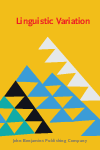
Linguistic Variation
metrics 2024
Fostering Dialogue on Linguistic Diversity
Introduction
Linguistic Variation is a prestigious academic journal dedicated to advancing the field of linguistics and language studies. Published by John Benjamins Publishing Co, this journal provides a comprehensive platform for researchers, educators, and students to explore the rich diversity of linguistic practices and theories. With an ISSN of 2211-6834 and an E-ISSN of 2211-6842, it spans a crucial timeline from 2017 to 2024. Renowned for its rigorous peer-review process, Linguistic Variation holds Q2 status in Linguistics and Language and Q3 in Food Science within the 2023 category quartiles, reflecting its significant role in interdisciplinary research. The journal ranks #412 out of 1088 in Arts and Humanities and #489 out of 1167 in Social Sciences according to Scopus, indicating its growing influence and esteem in the academic community. Researchers will appreciate its focus on empirical studies and theoretical advancements while benefiting from a wide array of access options that cater to varied readership needs. As a vital resource in linguistics, it aims to foster critical dialogue and innovation within the discipline.
Metrics 2024
 0.20
0.20 0.30
0.30 0.40
0.40 7
7Metrics History
Rank 2024
Scopus
JCI (Web Of Science)
Quartile History
Similar Journals
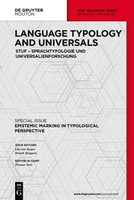
STUF-Language Typology and Universals
Illuminating the Rich Tapestry of Global LanguagesSTUF-Language Typology and Universals, published by WALTER DE GRUYTER GMBH, is a renowned journal in the field of linguistics focusing on language typology and universals. With an ISSN of 1867-8319 and an E-ISSN of 2196-7148, this journal has established itself as a significant source of scholarly research, evidenced by its strong rankings, including a Q2 classification in the linguistics category for 2023. The journal aims to explore the rich diversity of languages while seeking to uncover the underlying principles that govern their structures and functions. Its interdisciplinary scope appeals to linguists, cognitive scientists, and social scientists alike, fostering a deeper understanding of language as a fundamental human capacity. Researchers and professionals are encouraged to contribute to this academic discourse, as it plays a vital role in advancing the field of language studies. With access options through various platforms, STUF continues to disseminate high-quality research and stimulate innovative thoughts within the linguistic community, making it an indispensable resource for scholars and students worldwide.
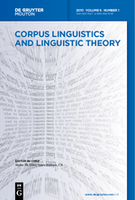
Corpus Linguistics and Linguistic Theory
Advancing linguistic insights through empirical exploration.Corpus Linguistics and Linguistic Theory, published by DE GRUYTER MOUTON, is a premier academic journal dedicated to advancing the interdisciplinary field of linguistics through the lens of corpus-based research methodologies. With an ISSN of 1613-7027 and E-ISSN 1613-7035, this journal is a valuable resource for linguists, researchers, and students who aim to investigate language structures, usage, and their theoretical implications. Recognized as a Q1 journal in the realm of Linguistics and Language, it boasts impressive Scopus rankings, positioning it within the top 7% and 8% of its categories in the Arts and Humanities and Social Sciences, respectively. Its relevance is underscored by a commitment to publishing rigorous research from 2005 to 2024, addressing contemporary advancements in linguistic theory fueled by empirical data. While the journal is not open access, it remains an essential platform for disseminating high-quality scholarship that informs both theoretical perspectives and practical applications in linguistics. As such, Corpus Linguistics and Linguistic Theory plays a crucial role in shaping the future of linguistic studies, making it indispensable for anyone engaged in this dynamic field.
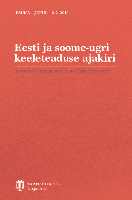
Eesti ja Soome-Ugri Keeleteaduse Ajakiri-Journal of Estonian and Finno-Ugric Linguistics
Advancing the Understanding of Finno-Ugric LinguisticsEesti ja Soome-Ugri Keeleteaduse Ajakiri - Journal of Estonian and Finno-Ugric Linguistics is a premier academic journal published by UNIV TARTU PRESS, dedicated to advancing the field of linguistics with a particular focus on the Estonian and Finno-Ugric languages. Since its inception, the journal has embraced an Open Access publishing model, allowing researchers and enthusiasts to freely explore its groundbreaking studies and findings since 2013. With an Impact Factor that places it in the Q3 quartile of leading journals within the linguistic domain, it serves as a vital platform for the dissemination of new research and theoretical advancements. Ranked 410th out of 1088 journals in the Arts and Humanities category for Language and Linguistics, it reflects a robust commitment to quality scholarship that appeals to academics, professionals, and students alike. Operating from Tartu, Estonia, the journal aims to foster greater understanding and appreciation of the Estonian language within the broader context of Finno-Ugric studies, making it an essential resource for anyone interested in these unique linguistic cultures.

Language and Linguistics Compass
Exploring the Frontiers of Linguistic KnowledgeLanguage and Linguistics Compass, published by Wiley, stands as a premier journal in the field of linguistics, showcasing innovative and interdisciplinary research. With its ISSN 1749-818X and E-ISSN matching, the journal has built a robust reputation, achieving an impressive Q1 ranking within the linguistics category for 2023, placing it in the top 4% of its field. Its Scopus rank of 48 out of 1167 highlights its influence and significance among linguistics journals, boasting a commendable 95th percentile. This journal serves as a vital resource for researchers, professionals, and students, offering a wide range of accessible articles that illuminate current trends and advances within the domain of language studies. Although it is not Open Access, the journal is committed to quality and diversity in its publications, ensuring scholarly articles from various sub-disciplines of linguistics are represented from 2008 through 2024. Located in the United Kingdom, Language and Linguistics Compass invites contributions from around the globe, reinforcing its status as a leading forum for linguistic discourse.
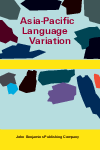
Asia-Pacific Language Variation
Exploring the Rich Tapestry of Asia-Pacific LinguisticsAsia-Pacific Language Variation is a prominent scholarly journal published by John Benjamins Publishing Co, dedicated to the exploration and analysis of linguistic diversity across the Asia-Pacific region. With its ISSN 2215-1354 and E-ISSN 2215-1362, the journal serves as a key resource for researchers and practitioners in the fields of linguistics and language studies. Since its inception in 2019, it has quickly ascended in stature, receiving a 2023 category quartile ranking of Q2 in Linguistics and Language and achieving impressive Scopus rankings, placing it in the 83rd percentile in Arts and Humanities and 81st in Social Sciences. Through its rigorous peer-reviewed articles, the journal aims to foster a deeper understanding of language variation, promoting interdisciplinary research and collaboration. Although it is not an open-access journal, the depth of research and critical insights offered in its pages make it an invaluable asset for academics, students, and professionals keen on the nuances of language within the dynamic Asia-Pacific context.
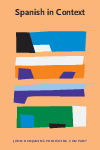
Spanish in Context
Navigating the Depths of Spanish Contextual StudiesSpanish in Context, published by John Benjamins Publishing Co, is a leading journal in the field of linguistics and literature, focusing on the contexts and uses of the Spanish language. With an ISSN of 1571-0718 and an E-ISSN of 1571-0726, this reputable journal has established itself as an essential resource for researchers, professionals, and students alike since its inception in 2004. The journal enjoys a strong presence in academic discourse, holding a prestigious Q2 category ranking in Linguistics and Language, and an esteemed Q1 ranking in Literature and Literary Theory for the year 2023. Furthermore, its contributions to the field are underscored by impressive Scopus rankings: it occupies the 40th position in the Arts and Humanities category for Literature and Literary Theory, representing the top 96th percentile. With an ongoing commitment to advancing scholarship and understanding of Spanish in various contexts until 2024, the journal welcomes original research articles, reviews, and critical essays that delve into linguistic innovations and literary trends. By fostering a dynamic dialogue among academics and practitioners, Spanish in Context plays a vital role in enhancing the visibility and relevance of Spanish studies on a global scale.
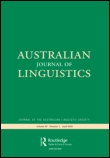
Australian Journal of Linguistics
Connecting Scholars to Language's Rich TapestryThe Australian Journal of Linguistics, published by Routledge Journals, Taylor & Francis Ltd, stands as a distinguished platform in the field of linguistics, fostering rigorous academic discourse since its inception in 1981. With an ISSN of 0726-8602 and an E-ISSN of 1469-2996, the journal has achieved a notable Q2 ranking in the linguistics and language category for 2023, indicating its quality and relevance within the academic community. With a Scopus ranking of #316 in Arts & Humanities and #373 in Social Sciences, it sits in the 71st and 68th percentiles respectively, underscoring its impact in the fields it encompasses. The journal aims to publish high-quality research articles that contribute to the understanding of linguistic theory, sociolinguistics, and applied linguistics, making it an essential resource for researchers, professionals, and students alike. The journal is based in the United Kingdom, at 2-4 Park Square, Milton Park, Abingdon OX14 4RN, Oxon, England, and actively encourages contributions that can expand the current linguistic discourse, reinforcing its commitment to highlighting diverse perspectives in language research.
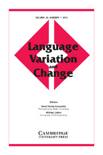
Language Variation and Change
Unraveling the Threads of Language EvolutionWelcome to Language Variation and Change, a prestigious journal published by Cambridge University Press and dedicated to the rigorous exploration of linguistic diversity and its evolution. With an ISSN of 0954-3945 and an E-ISSN of 1469-8021, this journal has been a pivotal platform for scholars since its inception in 1989, continuing to publish cutting-edge research up to 2024. Language Variation and Change is recognized in the top quartile for Linguistics and Language (Q1) and holds an impressive Q2 ranking in Education for 2023, underscoring its significant contribution to these fields. Its strong Scopus rankings—placing it in the 86th percentile for Arts and Humanities in Language and Linguistics—highlight its impact and quality. This journal aims to foster a deeper understanding of the dynamic interplay between language and society, making it essential reading for researchers, professionals, and students eager to engage with the latest findings and theoretical discussions in the arena of sociolinguistics. Stay connected with the evolving landscape of language studies through Language Variation and Change.
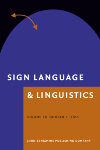
Sign Language & Linguistics
Bridging Cultures through Sign Language ResearchSign Language & Linguistics is an esteemed academic journal published by John Benjamins Publishing Co, dedicated to advancing the field of sign language studies and linguistics. With an ISSN of 1387-9316 and an E-ISSN of 1569-996X, this journal has earned a prominent place in the linguistic community, achieving a Q1 ranking in both the Linguistics and Language category, and standing out within the Scopus rankings, placing in the 77th percentile among the Arts and Humanities and 75th percentile in the Social Sciences categories. Sign Language & Linguistics spans over two decades of research, offering comprehensive insights and analyses from 1998 to 2024, promoting high-quality scholarly communication. Aimed at researchers, professionals, and students alike, this journal is essential for those exploring the intersection of sign languages, linguistics, and cultural studies, facilitating progressive discourse and fostering an understanding of this vital mode of human communication.
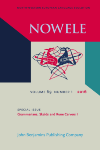
NOWELE-North-Western European Language Evolution
Innovating Insights into Language EvolutionNOWELE-North-Western European Language Evolution, published by John Benjamins Publishing Co, serves as a vital platform for researchers and scholars interested in the evolution and dynamics of North-Western European languages. With an ISSN of 0108-8416 and an E-ISSN of 2212-9715, this journal has been contributing to the field of linguistics since its inception in 1983, with ongoing publications until 2024. Indexed in Scopus and classified in the Q3 category for Linguistics and Language, NOWELE is recognized for its rigorous academic standards and diverse contributions, ranking #485 out of 1088 in the Arts and Humanities category, and #566 out of 1167 in Social Sciences. The journal fosters an open dialogue within the linguistic community, presenting innovative research findings and theoretical advancements. Researchers, professionals, and students alike benefit from its systematic exploration of language evolution in the context of a rapidly changing global linguistic landscape.